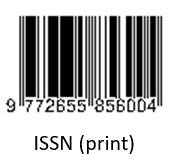Cloud Quantum Coin-Tossing Gambling
(1) New American Quantum Education Society Operations
(*) Corresponding Author
Abstract
Full Text:
PDFReferences
Zhang P., Zhou XQ, Wang YL, et al. Quantum gambling based on Nash-equilibrium. npj Quantum inf. 3 (24) (2017).
Lu Zhou, Xin Sun, Chunhua Su, Zhe Liu, Kim-Kwang, Raymond Chou, Game theoretic security of quantum bit commitment, Information Science 479 (2019).
Daniel Centeno, German Sierra, General quantum chinos game, 6 (7).
Yuyang Han, Cheat-sensitive coin flipping and quantum gambling, Quantum information Processing 21(170) (2022).
Luyao Wang, Hai Cheng, Pseudo-Random number generator based on logistic chaotic system, Entropy 21(10), 960 (2019).
Fei Yu, Lixiang Li, Qiang Tang, Shuo Cai, Yun Song, Quan Xu, A survey on true random number generator base on chaos, discrete Dynamics in nature and society, (2019).
U. Ansari, A. K. Chaudhary and S. Verma, True Random Number Generator (TRNG) Using Sensors for low Cost IoT Applications, 2022 International Conference on Communication, Computing and Internet of Things (IC3IoT), Chennai, India, (2022) 1-6.
Christina Chamon, Shahriar Ferdous, and Laszlo B. Kish, Deterministic random number generator attack against the kirchhoff-law-Johnson-Noise secure key exchange protocol, Fluctuation and Noise Letters, 20(5) (2021) 2150046.
Yutaka Shikano, Unpredictable random number generator, AIP Conference Proceedings 2286 (2020) 040004.
Miguel Herrero-Collantes, Juan Carlos Garcia-Escartin, Quantum random number generators, Rev. Mod. Phys. 89 (2017) 015004.
Jaideep Patnak, Brian Hunt, Michelle Girvan, Zhixin Lu, Edward Ott, Model-free prediction of Large spatiotemporally chaotic system from Data: A reservoir computing approach. Phys. Rev. Lett. 120 (2018) 024102
John Preskill, Quantum Computing in the NISQ era and beyond, Quantum 2, 79 (2018)
McEwen, M., Faoro, L., Arya, K. et al. Resolving catastrophic error bursts from cosmic rays in large arrays of superconducting qubits. Nat Phys. 18 (2022) 107-111.
Lior Goldenberg, Lev Veidman, and Stephen Wiesner, Quantum gambling, Phys. Rev. Lett. 82 (1999) 3356.
Ireneuz Pokula, Quantum gambling using mesoscopic ring qubits Physica Status Solidi (b) Vol. 244(7) (2007) 2513-2515.
Davide Castelvecchi, IBM’s quantum cloud computer goes commercial, Nature 543 (7644) (2017).
Charles H. bennett, Gilles Brassard, Quantum cryptopgraphy: Public Key distribution and coin tossing, Theoretical computer Science Volume 560, Part 1, 4 (2014).
Blum, Manuel Coin flipping by telephone a protocol for solving impossible problems. ACM SIGACT News 15(1) 23-27.
Anna Pappa, Paul Jouguet, Thomas Lawson, Andre Chailloux, Matthieu Lagre, Patrick Trinkler, Lordanis Kernidis, Eleni Diamanti, Experimental plug and play quantum coin flipping, Nature Communications 5(3717) (2014).
DOI: https://doi.org/10.24071/ijasst.v5i2.6407
Refbacks
- There are currently no refbacks.
Publisher : Faculty of Science and Technology
Society/Institution : Sanata Dharma University

This work is licensed under a Creative Commons Attribution 4.0 International License.












